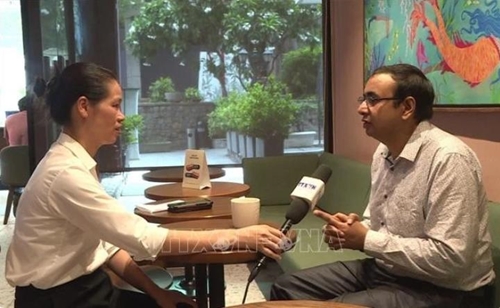During an interview with the Vietnam News Agency correspondents in New Delhi ahead of the 100th anniversary of the Vietnam Revolutionary Press Day (June 21, 1925–2025), Ghosh, who has visited Vietnam multiple times to report on political, economic, cultural, and social issues, emphasized the significant role of Vietnam’s press agencies during the COVID-19 pandemic, when they provided transparent and timely updates that helped global audiences understand the country’s approach to managing the crisis.
    |
 |
|
Journalist Rudroneel Ghosh speaks during an interview with the Vietnam News Agency’s resident correspondent in New Delhi. |
Thanks in part to that effective communications, Vietnam was recognized internationally as a model in pandemic response. Ghosh emphasized that this success would not have been possible without the efforts by the country’s professional and dedicated press outlets.
He also noted that Vietnamese press outlets, including the Vietnam News Agency (VNA), have proven highly effective in presenting the country’s perspectives on other critical issues. Such information is especially valuable for international scholars and observers, as these viewpoints are not always readily available through international mainstream media.
In recent decades, Vietnam’s mainstream media has become a reliable and persuasive channel for showcasing the nation’s development policies and achievements, especially in economic matters.
Looking ahead, in an era of constant changes and rising global challenges, Ghosh expressed confidence that Vietnamese journalism, especially state-run outlets like VNA, will continue to maintain professional standards, uphold the principle of truth, and contribute positively to shaping an accurate narrative of the country’s policies, achievements, and orientations.
Addressing broader concerns in global journalism, Ghosh pointed to a growing perception that the media has shifted from its traditional mission of informing the public to instead constructing “narratives” designed to shape public opinion. In response, he invoked a core principle once emphasized by President Ho Chi Minh: journalism must serve the people.
This principle is more essential now than ever, Ghosh said, warning that much of today’s media has become more focused on manipulation, shallow entertainment, or sensationalism, rather than addressing the real needs and interests of the public.
Answering the question of how journalism can return to its core mission, he stressed that journalists must proactively seek out and tell stories that reflect the lives, rights, and needs of the people. He called on news organizations to reflect on their role and commit to a more constructive and people-centered form of journalism.
Staying true to the philosophy of "putting people at the center," as advocated by President Ho Chi Minh, can serve as a powerful defense against misinformation and fake news. This approach can also help maintain public trust in mainstream media, Ghosh stated.
That is the right path for journalism to preserve its value and credibility in the 21st century, he affirmed.
Source: VNA